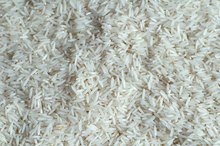Maltodextrin & Weight Loss
Maltodextrin is a common ingredient in many ready-to-drink protein shakes and sports drinks. This complex carbohydrate digests quickly, which can provide many performance enhancing benefits to weight-lifters, athletes and bodybuilders. However, due to its high-glycemic carbohydrates, you may wish to avoid the intake of maltodextrin in large amounts throughout the day to achieve weight loss. Always consult with your doctor before using any dietary supplements.
Identification
Maltodextrin is a corn-derived oligosaccharide source of carbohydrates, and it is commonly added to commercial ready-made protein shakes and other products. Oligosaccharides contain between three and 20 linked sugars, but they qualify as complex carbohydrates. Some products include maltodextrin as a sweetener because it is not technically a sugar, allowing companies to call their products "sugar-free."
Significance
Bodybuilding: Dextrose Vs. Maltodextrin
Learn More
Carbohydrates play a huge role in your battle for weight loss. The primary source of fuel for the body, carbohydrates also readily store as body fat, according to "Xtreme Lean" by professional body builders Jonathan Lawson and Steve Holman 2. In particular, fast-digesting carbs like maltodextrin spike the hormone insulin, which triggers more of the sugars to get stored as body fat. At first glance, it may seem that maltodextrin has no place in a weight loss diet or nutrition program. However, maltodextrin's effects on insulin levels can prove advantageous if you use it at the right times.
- Carbohydrates play a huge role in your battle for weight loss.
- However, maltodextrin's effects on insulin levels can prove advantageous if you use it at the right times.
Effects
Maltodextrin spikes insulin and glucose levels more than white bread, another high-glycemic and fast-digesting carb. One beneficial time to purposely trigger high insulin secretion is immediately after a workout, when the body needs to quickly replenish carbohydrates stores in the form of muscle glycogen. For example, Gatorade and Powerade contain maltodextrin for muscle recovery. Insulin drives glucose, amino acids, minerals and vitamins into muscle cells to begin the process of repair, according to "Optimum Anabolics" by Jeff Anderson 3.
- Maltodextrin spikes insulin and glucose levels more than white bread, another high-glycemic and fast-digesting carb.
- One beneficial time to purposely trigger high insulin secretion is immediately after a workout, when the body needs to quickly replenish carbohydrates stores in the form of muscle glycogen.
Benefits
Isometric Diet
Learn More
Maltodextrin can provide a convenient source of high-glycemic carbohydrates that you can add to homemade protein shakes, fruit smoothies or sports drinks. In fact, maltodextrin commonly appears in weight-gainer and post-workout recovery formulas. Supplying the proper nutrients for muscle recovery after a workout allows the body to burn fat more effectively. In fact, malnourished muscles get cannibalized for energy usage, which slows down metabolic rate, according to David Zinczenko, author of "The Abs Diet. 4"
- Maltodextrin can provide a convenient source of high-glycemic carbohydrates that you can add to homemade protein shakes, fruit smoothies or sports drinks.
- In fact, maltodextrin commonly appears in weight-gainer and post-workout recovery formulas.
Misconceptions
Not all complex carbohydrates are inherently good and not all sugars are necessarily evil, according to Zinczenko. Some complex carbohydrates, like maltodextrin, digest quickly and can therefore promote fat gain. On the other hand, natural fructose sugars from fresh fruit have low scores on the glycemic scale, meaning they do not significantly spike insulin levels. Carbohydrate-timing becomes important because low-glycemic carb intake encourage fat loss throughout the day. High-glycemic carbs speed muscle recovery and support weight loss after your workouts, according to Lawson and Holman.
- Not all complex carbohydrates are inherently good and not all sugars are necessarily evil, according to Zinczenko.
- On the other hand, natural fructose sugars from fresh fruit have low scores on the glycemic scale, meaning they do not significantly spike insulin levels.
Related Articles
References
- "Muscle & Fitness Presents 2010 Edition: The Ultimate Supplement Handbook;" The Carbo Rater; Jordana Brown; January 2010
- "Xtreme Lean;" Jonathan Lawson and Steve Holman; 2005
- "Optimum Anabolics;" Jeff Anderson; 2004
- "The Abs Diet;" David Zinczenko; 2004
- U.S. Food & Drug Administration. ‘Gluten-Free’ Means What It Says. Updated May 11, 2018.
- The Sugar Association, Inc. Nutrition Labeling.
- GrokFood Online Food Additives Database: U.S. Code of Federal Regulations.
Writer Bio
Andrew Bennett enjoys exploring health and fitness through his personal workouts, as well as researching the latest about the subject. As a natural body builder, Bennett enjoys the ongoing pursuit of health and wellness in all aspects of life. He writes articles, blogs, copy, and even award-winning screenplays.








